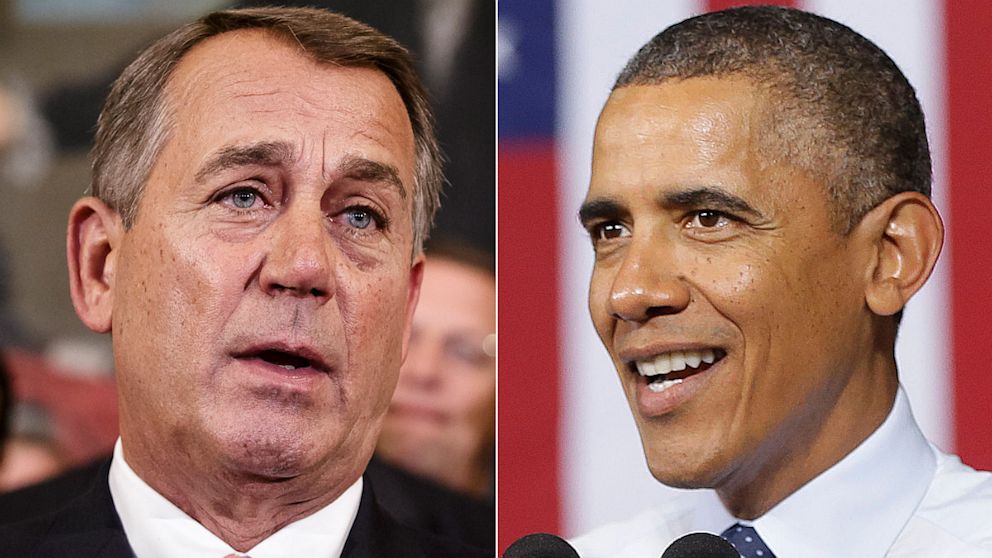Boehner Says Obama Should 'Absolutely Not' Coordinate With Iran On Iraq Crisis
House Speaker has advice for the president on Iraq.

June 18, 2014— -- House Speaker John Boehner said the Obama administration should “absolutely not” coordinate with Iran as it formulates a response to the destabilizing situation in Iraq, where a radical Islamic militia is threatening Baghdad.
“I can just imagine what our friends in the region, our allies, will be thinking by reaching out to Iran at a time when they continue to pay for terrorists and foster terrorism, not only in Syria and in Lebanon but in Israel as well,” Boehner, R-Ohio, told reporters at a news conference today at the Capitol.
Secretary of State John Kerry said earlier this week that the U.S. was "open" to cooperation with Iran to stabilize Iraq, and Iran's president made similar statements this week.
President Obama has invited the top Congressional leadership – Boehner, House Minority Leader Nancy Pelosi, Senate Majority Leader Harry Reid and Senate Minority Leader Mitch McConnell - for an Oval Office briefing at the White House this afternoon at 3 p.m.
Iraqis Post to Whisper After Social Media Crackdown
Ghosts of U.S. Troops Left at Kirkuk Base After Iraqi Army Fled
ISIS Leader’s Ominous New York Message in Doubt, But US Still on Edge
Boehner refused to comment on calls for drone airstrikes or specify whether he would support deploying ground troops to Iraq, but he pressured Obama “to outline an overall strategy for success.”
Obama Unlikely To Order Large Scale Air Offensive in Iraq
Iraqis Post to Whisper After Social Media Crackdown
“What I'm hoping to hear from the president today is the broader strategy for how we help keep the freedom that we paid dearly for the people of Iraq,” Boehner said. “There's more than one step here. I'm looking for the overall strategy that'll help secure the gains that we've made.”
Boehner criticized the Obama administration for failing to recognize months of warning signs that the Islamic State of Iraq and Syria, a fanatic group known as ISIS, was making significant gains as violence spread across the country.
“The government of Iraq clearly is not the most effective government. They've had their challenges in terms of understanding how to run a free society and a government that's open,” he said. “But having said that, it is nothing new. The president's been watching what we've been watching for over a year as the situation in Iraq continued to be undermined. And yet nothing – nothing – nothing has happened to try to reverse it.”
Several senior administration officials, including Ambassador Anne W. Patterson, Assistant Secretary of State for the Bureau of Near Eastern Affairs, are also at the Capitol today conducting classified briefings for the House Foreign Affairs and Armed Services Committees.
House Armed Services Chairman Buck McKeon expressed bewilderment that the administration is considering coordinating with Iran to help quell the violence in Iraq.
“We got Russia to help us out in Syria. Now we're ... having Iran help us out in Iraq. It's amazing,” McKeon, R-Calif., said. “The way [the United States] has gone in the last couple of years is just mind-boggling.”
Rep. Adam Kinzinger, who flew missions over Iraq and Afghanistan, said that in addition to an air offensive, Obama should deploy special operations teams to work with Iraqi forces. Still, Kinzinger, a two-term congressman who currently serves as a major in the Air National Guard, stressed that he does not want any U.S. troops on the ground in Iraq.
“It's a mess,” Kinzinger, R-Ill., said today. “Our only best hope is the preservation of the Iraqi state, and that's going to include some form of airstrikes. It's not going to be pretty. It's not the panacea, but I think it gives breathing room for the Iraqi government to be able to counterattack, to be able to buy some time and what you can do when you do airstrikes is button down and pin down ISIS in the cities that they're in so it restricts their freedom of movement.”




